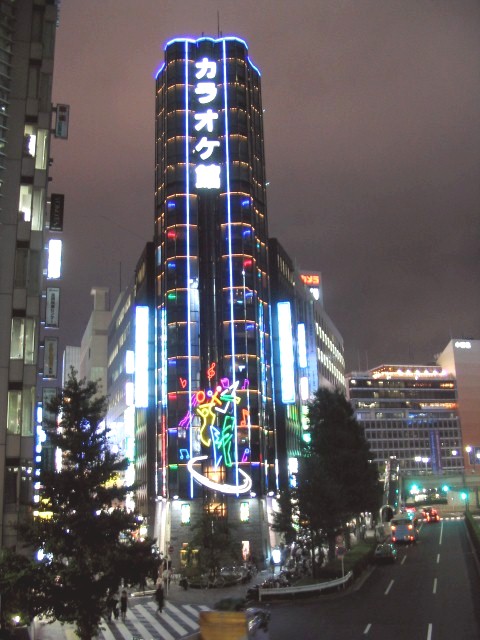His invention must be considered globally influential, because it makes millions happy, the savior of countless festivals and sometimes also the torture of hearing-sensitive neighbors.
Daisuke Inoue, the great people of the rising sun, forgot to register for copyright, so he missed the opportunity to make money with his revolutionary ideas.
In the end, he also stepped up to glory
… to hear the thanks of the Nobel Prize Committee. More precisely, the annual Ig-Nobel Prize with the ultimate motto “fun is the main”, is given to the scientific achievements left behind.
It was a beautiful day in 2004, more than four decades after Daisuke Inoue’s great invention.
The man with grizzly head and slightly oversized glasses walked up on stage to receive the “downstream” award for “Nobel Peace”; more than anyone else, he understood that this was fun, even though the pleasure belonged to millions of other beneficiaries, he himself should have made a lot of money.

So what did Inoue do so badly that the vast majority of us have never heard of the name? The Osaka native man, according to the committee’s award, “has developed an entirely new way to teach people to embrace each other”.
Inoue’s idea has increased mutual understanding and deep sympathy between people: a stage, a microphone, a room full of people who are willing to pour out all the embarrassments and the everyday thoughts to release the sagging and lunging screams screamed their favorite songs with an average difference of about two, three notes compared to the original, sometimes in the language they innocently considered English, French, Chinese, or standard dialect, is very standard.
Yes, Daisuke Inoue was the inventor of the karaoke industry, and it should have been a rich man, if he did not make a simple mistake.
It all started
… In the 1970s in Kobe, the coastal city 400 kilometers southwest of Tokyo, where the music not only helped breed cows provide famous steaks, but also a means to earn food for many bands .
They perform in restaurants and pubs, not rarely having to disrupt the audience by letting them go on stage to steal the microphone. At that time, in a few minutes, the band had a new singer with a lot of expectations and talent for singing.
Back then Daisuke Inoue was 31 years old, playing drums in a band, and a free day he came up with an idea: why not take advantage of the breaks and let diners sing on the pre-recorded music on cassettes?
Thinking of doing it, he played a cassette receiver with a small acoustic amplifier for the guitar, stuffed it into a red-and-white painted wooden box, and connected it all with a microphone.
A simple structure allows the electrical current to be connected when users insert coins, and the first karaoke machine (kara: empty, oke: orchestra) is born, in principle no different today, only poorly. more convenient because of the lack of a computer selective assistant.
Unexpected success made Inoue constantly build more machines and improve technology.
He recorded hundreds of songs by local colleagues with moderate pitch, easy for the restaurants in Kobe to rent, along with the lyrics that he printed into books.
Soon the karaoke fever spreads to big cities like Osaka, Tokyo, gradually nationwide. Inoue founded Crescent Company, transported technical equipment and new songs by small trucks to customers of all regions.
Be passionate about work
… Inoue forgot to stir up a decisive stage of copyright registration for his invention. Rather, he did not think that he had invented something new, but only joined the techniques available.
In addition, the copyright registration fee is a few thousand dollars.
“I’m thinking. Why spend that much money?,” he recounted in 2007 to American journalist Brian Raftery, the author of the Karaoke book that took over the world and transformed my life.
Inoue’s humility with a slight tendency was immediately taken advantage of by mischievous businessmen.
In the late 1970s, dozens of Japanese enterprises launched karaoke machines to the market, causing Inoue’s sales to drop.
Then non-digital technology is also on the verge of extinction, making karaoke restaurants try to dispose of old machines that use cassettes.
In 1993 Daisuke Inoue suffered a nervous breakdown, had to be in a mental hospital for three months. As he recounted, at that time he had enough capital to hold his back but found life too empty because there was no major goal to pursue.
A new initiative to help Inoue
… back to business life. He developed a small metal box, which secreted toxic gas at night to kill cockroaches, which were the culprit who bites the wire in a karaoke machine.
Ironically, when his initiative benefited those who stole his own invention. At least at this point, he has faded away from the old hatred, and the immense world doesn’t know the name Daisuke Inoue to forget?
Without the 1999 Asian Time magazine, the list of the 100 most influential figures in the 20th century will be listed.
And among the resounding names like Mao Zedong and Mahatma Gandhi appeared Daisuke Inoue! Time honored him for “giving the voice to the dumb and changing the face of the Asian night” – wasn’t that a awesome and cool word?
Indeed, Inoue’s idea was the beginning of a cultural revolution in its positive sense.
In Japan, almost every street corner has a karaoke bar with a scale of one to five stars. Even in a taxi or a bath, there is a happy karaoke for guests.
And though humble, Inoue believed that he had contributed to changing his compatriots: “Japanese people were discreet and introverted, but pressing into their hands a microphone they would never stop singing!”.
The applause after his thanksgiving at the Ig-Nobel award was recognized as the longest in the history of the tournament.

